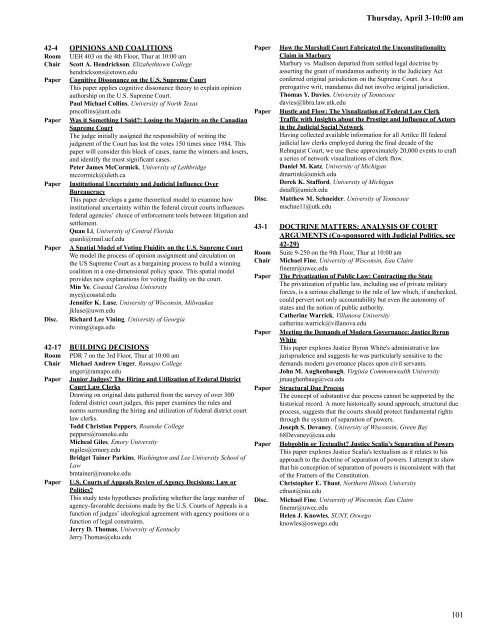2008 Conference Program - Midwest Political Science Association
2008 Conference Program - Midwest Political Science Association
2008 Conference Program - Midwest Political Science Association
You also want an ePaper? Increase the reach of your titles
YUMPU automatically turns print PDFs into web optimized ePapers that Google loves.
Thursday, April 3-10:00 am<br />
42-4 OPINIONS AND COALITIONS<br />
Room UEH 403 on the 4th Floor, Thur at 10:00 am<br />
Chair Scott A. Hendrickson, Elizabethtown College<br />
hendricksons@etown.edu<br />
Paper Cognitive Dissonance on the U.S. Supreme Court<br />
This paper applies cognitive dissonance theory to explain opinion<br />
authorship on the U.S. Supreme Court.<br />
Paul Michael Collins, University of North Texas<br />
pmcollins@unt.edu<br />
Paper Was it Something I Said: Losing the Majority on the Canadian<br />
Supreme Court<br />
The judge initially assigned the responsibility of writing the<br />
judgment of the Court has lost the votes 150 times since 1984. This<br />
paper will consider this block of cases, name the winners and losers,<br />
and identify the most significant cases.<br />
Peter James McCormick, University of Lethbridge<br />
mccormick@uleth.ca<br />
Paper Institutional Uncertainty and Judicial Influence Over<br />
Bureaucracy<br />
This paper develops a game theoretical model to examine how<br />
institutional uncertainty within the federal circuit courts influences<br />
federal agencies’ choice of enforcement tools between litigation and<br />
settlement.<br />
Quan Li, University of Central Florida<br />
quanli@mail.ucf.edu<br />
Paper A Spatial Model of Voting Fluidity on the U.S. Supreme Court<br />
We model the process of opinion assignment and circulation on<br />
the US Supreme Court as a bargaining process to build a winning<br />
coalition in a one-dimensional policy space. This spatial model<br />
provides new explanations for voting fluidity on the court.<br />
Min Ye, Coastal Carolina University<br />
mye@coastal.edu<br />
Jennifer K. Luse, University of Wisconsin, Milwaukee<br />
jkluse@uwm.edu<br />
Disc. Richard Lee Vining, University of Georgia<br />
rvining@uga.edu<br />
42-17 BUILDING DECISIONS<br />
Room PDR 7 on the 3rd Floor, Thur at 10:00 am<br />
Chair Michael Andrew Unger, Ramapo College<br />
unger@ramapo.edu<br />
Paper Junior Judges The Hiring and Utilization of Federal District<br />
Court Law Clerks<br />
Drawing on original data gathered from the survey of over 300<br />
federal district court judges, this paper examines the rules and<br />
norms surrounding the hiring and utilization of federal district court<br />
law clerks.<br />
Todd Christian Peppers, Roanoke College<br />
peppers@roanoke.edu<br />
Micheal Giles, Emory University<br />
mgiles@emory.edu<br />
Bridget Tainer Parkins, Washington and Lee University School of<br />
Law<br />
bmtainer@roanoke.edu<br />
Paper U.S. Courts of Appeals Review of Agency Decisions: Law or<br />
Politics<br />
This study tests hypotheses predicting whether the large number of<br />
agency-favorable decisions made by the U.S. Courts of Appeals is a<br />
function of judges’ ideological agreement with agency positions or a<br />
function of legal constraints.<br />
Jerry D. Thomas, University of Kentucky<br />
Jerry.Thomas@eku.edu<br />
Paper<br />
Paper<br />
Disc.<br />
How the Marshall Court Fabricated the Unconstitutionality<br />
Claim in Marbury<br />
Marbury vs. Madison departed from settled legal doctrine by<br />
asserting the grant of mandamus authority in the Judiciary Act<br />
conferred original jurisdiction on the Supreme Court. As a<br />
prerogative writ, mandamus did not involve original jurisdiction.<br />
Thomas Y. Davies, University of Tennessee<br />
davies@libra.law.utk.edu<br />
Hustle and Flow: The Visualization of Federal Law Clerk<br />
Traffic with Insights about the Prestige and Influence of Actors<br />
in the Judicial Social Network<br />
Having collected available information for all Artilce III federal<br />
judicial law clerks employed during the final decade of the<br />
Rehnquist Court, we use these approximately 20,000 events to craft<br />
a series of network visualizations of clerk flow.<br />
Daniel M. Katz, University of Michigan<br />
dmartink@umich.edu<br />
Derek K. Stafford, University of Michigan<br />
dstaff@umich.edu<br />
Matthew M. Schneider, University of Tennessee<br />
mschne11@utk.edu<br />
43-1 DOCTRINE MATTERS: ANALYSIS OF COURT<br />
ARGUMENTS (Co-sponsored with Judicial Politics, see<br />
42-29)<br />
Room Suite 9-250 on the 9th Floor, Thur at 10:00 am<br />
Chair Michael Fine, University of Wisconsin, Eau Claire<br />
Paper<br />
Paper<br />
Paper<br />
Paper<br />
Disc.<br />
finemr@uwec.edu<br />
The Privatization of Public Law: Contracting the State<br />
The privatization of public law, including use of private military<br />
forces, is a serious challenge to the rule of law which, if unchecked,<br />
could pervert not only accountability but even the autonomy of<br />
states and the notion of public authority.<br />
Catherine Warrick, Villanova University<br />
catherine.warrick@villanova.edu<br />
Meeting the Demands of Modern Governance: Justice Byron<br />
White<br />
This paper explores Justice Byron White's administrative law<br />
jurisprudence and suggests he was particularly sensitive to the<br />
demands modern governance places upon civil servants.<br />
John M. Aughenbaugh, Virginia Commonwealth University<br />
jmaughenbaug@vcu.edu<br />
Structural Due Process<br />
The concept of substantive due process cannot be supported by the<br />
historical record. A more historically sound approach, structural due<br />
process, suggests that the courts should protect fundamental rights<br />
through the system of separation of powers.<br />
Joseph S. Devaney, University of Wisconsin, Green Bay<br />
68Devaney@cua.edu<br />
Hobgoblin or Textualist Justice Scalia’s Separation of Powers<br />
This paper explores Justice Scalia's textualism as it relates to his<br />
approach to the doctrine of separation of powers. I attempt to show<br />
that his conception of separation of powers is inconsistent with that<br />
of the Framers of the Constitution.<br />
Christopher E. Thuot, Northern Illinois University<br />
cthuot@niu.edu<br />
Michael Fine, University of Wisconsin, Eau Claire<br />
finemr@uwec.edu<br />
Helen J. Knowles, SUNY, Oswego<br />
knowles@oswego.edu<br />
101










